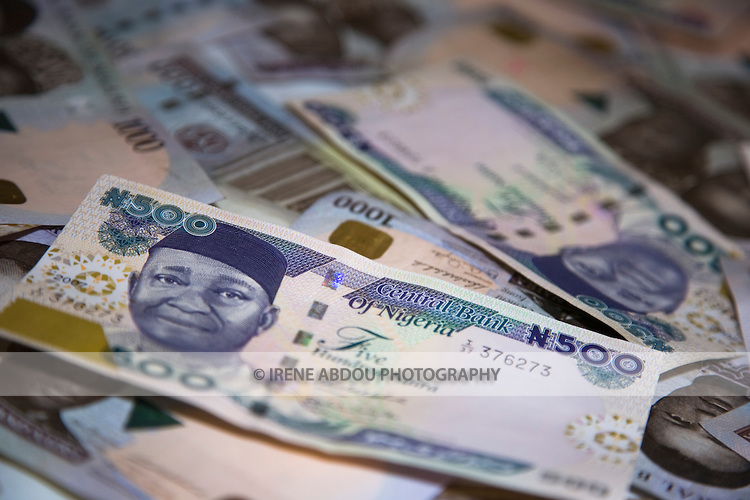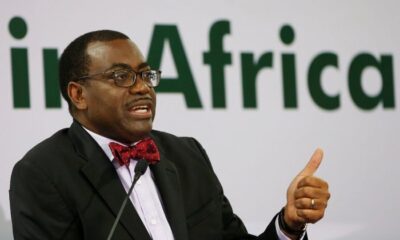Finance
FG, States Budget N5.6tr For Salaries, Overheads
Published
8 years agoon

- FG, States Budget N5.6tr For Salaries, Overheads
The federal and 36 state governments will spend half of their N13.5 trillion total budgets for the year on salaries and overheads.
Analysis of the 2017 budget documents shows that the central and 33 state governments would spend N5.9 trillion (41 percent) of their total budgets on salaries.The central government’s budget for the year is N7.29 trillion; of which the recurrent expenditure will gulp N2.98 trillion. Other components of the federal government budget are statutory transfers (N414 billion) and debt servicing (N1.66 trillion).
The central government’s budget for the year is N7.29 trillion; of which the recurrent expenditure will gulp N2.98 trillion. Other components of the federal government budget are statutory transfers (N414 billion) and debt servicing (N1.66 trillion).The 33 states have a combined budget of N6.22 trillion and they are spending N2.60 trillion (42 percent) on workers emoluments. There are no budget figures from Adamawa, Ondo and Kebbi states.
The 33 states have a combined budget of N6.22 trillion and they are spending N2.60 trillion (42 percent) on workers emoluments. There are no budget figures from Adamawa, Ondo and Kebbi states.The swollen recurrent expenditures keep coming despite the economic recession triggered by the dwindling oil revenues and low votes for development projects.
The swollen recurrent expenditures keep coming despite the economic recession triggered by the dwindling oil revenues and low votes for development projects.At Nigeria’s official exchange rate of 304 to a US dollar, the federal and state governments will spend $42.9 billion this year. The 33 states are spending $19.7 billion while the federal government is spending $23 billion.
At Nigeria’s official exchange rate of 304 to a US dollar, the federal and state governments will spend $42.9 billion this year. The 33 states are spending $19.7 billion while the federal government is spending $23 billion.Capital spending by the central and the state governments this year is N5.77 trillion (43 percent) – N2.24 trillion for the federal and N3.53 trillion for the states.
Capital spending by the central and the state governments this year is N5.77 trillion (43 percent) – N2.24 trillion for the federal and N3.53 trillion for the states.Further analysis of the budget estimates of the two tiers of government
Further analysis of the budget estimates of the two tiers of government show an increase of N1.3 trillion from last year’s N12.2 trillion.The total recurrent expenditures of the federal and state governments also rose by over N200 billion, from N5.3 trillion last year to N5.5 trillion this year.
The total recurrent expenditures of the federal and state governments also rose by over N200 billion, from N5.3 trillion last year to N5.5 trillion this year.Also, capital projects by the two tiers soared by over half a trillion naira. It rose from N5.04 trillion in 2016 to N5.77 trillion this year.
Also, capital projects by the two tiers soared by over half a trillion naira. It rose from N5.04 trillion in 2016 to N5.77 trillion this year.
The 17 northern states have a total budget of N2.38 trillion, witnessing a reduction of over N100 billion from last year’s N2.5 trillion. Of this, N1.37 trillion was for capital and N928 billion for recurrent, compared to last year’s N1.4 trillion and N1.1 trillion respectively.The total budget of the 16 southern states is N3.83 trillion against previous year’s N3.5 trillion. Of this, N2.15 trillion is capital and N1.67 trillion recurrent against N1.9 trillion and N1.5 trillion in 2016.
The total budget of the 16 southern states is N3.83 trillion against previous year’s N3.5 trillion. Of this, N2.15 trillion is capital and N1.67 trillion recurrent against N1.9 trillion and N1.5 trillion in 2016.
Small spenders
The seven states with the lowest approved budgets are Nasarawa (N67 billion), Yobe (N69 billion), Gombe (N86 billion), Ekiti (N94 billion), Abia (N103 billion), Enugu (N105 billion), Niger (N108 billion), and Taraba (N110 billion).
Big spenders
Lagos, with N813 billion, is leading the league of states with huge budgetary allocations. Other big spenders are Rivers (N470 billion), Akwa Ibom (N365 billion), Cross River (N301billion), Delta (N271 billion), Bayelsa and Ogun (N221 billion each), Kaduna (N215 billion), Kano (N210 billion) and Oyo (N207 billion).
Geopolitical analysis
On geopolitical basis, the seven states of the northwest zone (minus Kebbi) have a total budget of N1.01 trillion slightly lower than previous year’s N1.12 trillion. The budget has capital and recurrent components of N635.2 billion and N376.5 billion when compared with last year’s N698 billion and N479 billion irrespectively.The total budget for the northeast zone is N593.1 billion, about N80 billion lower than 2016’s N676 billion, with capital expenditure consuming N298 billion against last year’s N347 billion; leaving N209.8 billion for recurrent, which is lower than N326 billion for the previous year.
The total budget for the northeast zone is N593.1 billion, about N80 billion lower than 2016’s N676 billion, with capital expenditure consuming N298 billion against last year’s N347 billion; leaving N209.8 billion for recurrent, which is lower than N326 billion for the previous year.The north central zone’s approved budget for the year is N781.5 billion, a rise of about N100 billion from last year’s N684 billion. N439 billion is for capital and N342.4 billion for recurrent spending, unlike N385 billion and N343 billion in the previous year.
The north central zone’s approved budget for the year is N781.5 billion, a rise of about N100 billion from last year’s N684 billion. N439 billion is for capital and N342.4 billion for recurrent spending, unlike N385 billion and N343 billion in the previous year.The southwest zone’s budget for the year is N1.47 trillion, slightly higher than last year’s N1.36 trillion, with capital spending consuming N805.7 billion, leaving N668 for
The southwest zone’s budget for the year is N1.47 trillion, slightly higher than last year’s N1.36 trillion, with capital spending consuming N805.7 billion, leaving N668 for recurrent component. The zone has a recurrent vote of N695 billion and N671 billion capital, last year.The south-south region has a total budget of N1.77 trillion against N1.6 trillion last year, comprising N1.03 trillion capital and N750.6 billion recurrent expenditure. The oil-rich region spent N949 billion on capital projects and N579 billion on recurrent in 2016.
The south-south region has a total budget of N1.77 trillion against N1.6 trillion last year, comprising N1.03 trillion capital and N750.6 billion recurrent expenditure. The oil-rich region spent N949 billion on capital projects and N579 billion on recurrent in 2016.
The southeast’s total budget this year is N581.2 billion, about N90 billion increase from previous year’s N490 billion. It is made up of N324 billion capital and N257.3 billion recurrent votes; which is slightly higher than last year’s N242 billion and N248 billion respectively.
Huge recurrent expenses
The seven states with swollen recurrent expenses are Plateau, where Governor Samuel Lalong budgeted N68.5 billion for recurrent, leaving N64.3 billion for capital.
Osun State Governor Abdulrauf Aregbesola budgeted N138.2, allocating N75.8 billion for recurrent and N62.4 billion for capital votes.
Another state in this league is Nasarawa, where Governor Tanko Al-Makura, budgeted N67 billion, out of which N37 billion is for recurrent and N30 billion for capital expenditure.
In Yobe, Governor Ibrahim Gaidam budgeted N69 billion for the year, setting aside N42 billion for recurrent spending and N27 billion for capital projects. Governor Ayodele Fayose’s Ekiti State also has a higher recurrent vote, standing at N55.6 billion out of N94 billion, leaving N38.4 billion for capital expenditure.
Abia State votes N103 billion, setting aside N57.4 billion for recurrent and N45.1 billion for capital spending.
Among the oil-rich states, only Bayelsa and Delta’s recurrent budgets exceeded their capital votes. Of the N271 billion Delta expenditure, N152 billion is for recurrent and N119 billion for capital expenses.
Bayelsa State Governor Henry Seriake Dickson budgeted N221 billion for the year. Recurrent vote will consume N137 billion, leaving N84.3 billion for capital spending.
Is the CEO and Founder of Investors King Limited. He is a seasoned foreign exchange research analyst and a published author on Yahoo Finance, Business Insider, Nasdaq, Entrepreneur.com, Investorplace, and other prominent platforms. With over two decades of experience in global financial markets, Olukoya is well-recognized in the industry.

You may like
-
Nigeria Joins BRICS as Partner Country, Strengthening Global South Cooperation
-
70 Million Poorest of The Poor Nigerians To Get N75,000 From FG
-
Nigeria Surpasses OPEC Quota with 1.51 Million bpd, Targets 2.06 Million in 2025
-
Global Investors Commit $7.6 Billion to Nigeria’s Development at AIF 2024
-
Nigeria-China Trade Strengthened as Grimaldi Introduces Direct Shipping Line
-
Nigeria’s GDP Records 3.46% Growth in Q3 Spurred by Non-Oil Sector













